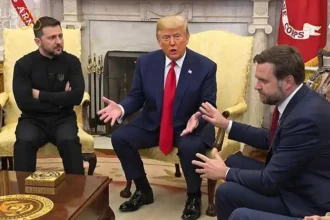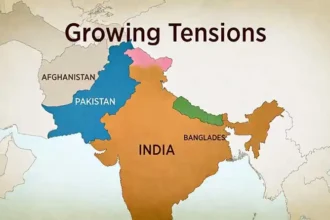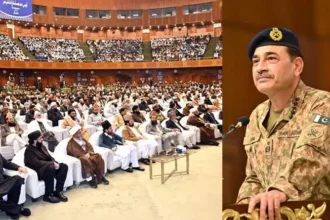In the quiet halls of the Pentagon, intelligence officers are worried. In the White House, President Donald Trump is making plans. And somewhere between Washington and Riyadh, a deal worth billions of dollars is taking shape.
The product? America’s most advanced fighter jet. The customer? Saudi Arabia. The concern? China might be watching.
When a Sale Becomes Something More
Fighter jets aren’t like cars. You can’t just walk into a showroom, kick the tires, and drive one home. Especially not the F-35s—a flying computer that costs around $80 million per plane and contains some of America’s most guarded military secrets.
But President Trump is considering selling these sophisticated war machines to Saudi Arabia. And next week, when Saudi Crown Prince Mohammed bin Salman walks through the White House doors, this deal might move from conversation to reality.
Trump didn’t hide his enthusiasm when reporters asked him about the upcoming visit. “It’s more than a meeting,” he said, his voice carrying that familiar confidence. “We’re honoring” Saudi Arabia.
Honoring. That’s an interesting word choice. Not just meeting with. Not just negotiating with. Honoring.
You Might like it: ‘Horizon’ plane’s futuristic shape could revolutionize flying
The Crown Prince Comes to Town
Crown Prince Mohammed bin Salman—often called MBS by people who’d rather not say his full name repeatedly—isn’t just any visitor. He’s essentially running Saudi Arabia while his father, the King, takes a less active role due to age.
MBS is a complicated figure. To some, he’s a reformer who’s modernizing a conservative kingdom. He’s allowed women to drive. He’s opened movie theaters. He’s trying to diversify Saudi Arabia’s economy beyond oil.
To others, he’s a ruthless leader linked to the murder of journalist Jamal Khashoggi, a critic who was killed inside a Saudi consulate in Turkey. That killing cast a long shadow over U.S.-Saudi relations.
But politics, especially international politics, has a short memory when money and power are involved.
What’s Really on the Table
Next week’s White House visit isn’t just about handshakes and photo opportunities. Trump and MBS are expected to sign economic and defense agreements. Plural. Multiple deals that will bind America and Saudi Arabia closer together.
The F-35 sale is the crown jewel of these potential agreements. These aren’t ordinary fighter jets. The F-35 is what’s called a “fifth-generation” fighter—packed with stealth technology that makes it nearly invisible to radar, equipped with sensors that can track threats from hundreds of miles away, and loaded with weapons systems that seem pulled from science fiction.
Only America’s closest allies get access to the F-35. Countries like Britain, Japan, and Israel. Selling one to Saudi Arabia would be a statement: you’re in the inner circle now.
But there’s a catch. Actually, several catches.
The China Problem
Here’s where the story gets tense. The New York Times reported something that should make everyone pay attention: a Pentagon intelligence report has raised red flags about this deal.
The concern? China.
American intelligence officers worry that if Saudi Arabia gets F-35s, China might find a way to access the technology. Not because Saudi Arabia would intentionally hand it over, but because keeping secrets in the modern world is incredibly difficult.
China has been trying for years to match America’s military technology. They’ve built their own stealth fighters, but experts say they’re still years behind the F-35. Getting access to even small pieces of F-35 technology could help China close that gap faster.
How might China get this technology? There are many possibilities. Saudi Arabia has business relationships with China. Chinese companies help build infrastructure in the kingdom. Information has a way of flowing, especially when billions of dollars and national interests are involved.
The Pentagon’s concerns aren’t paranoia. They’re based on decades of experience watching how sensitive technology spreads across borders, often in ways nobody intended.
The Israel Card
Trump mentioned something else to reporters: he hopes Saudi Arabia will soon join the Abraham Accords.
The Abraham Accords are agreements that normalized relations between Israel and several Muslim-majority countries, including the United Arab Emirates and Bahrain. Before these accords, many Arab nations refused to officially recognize Israel’s existence.
Getting Saudi Arabia to join would be huge. Saudi Arabia isn’t just another Arab country—it’s home to Islam’s holiest sites in Mecca and Medina. If Saudi Arabia normalizes relations with Israel, other Muslim nations might follow.
But Riyadh, Saudi Arabia’s capital, has been clear about their condition: they want to see a roadmap to Palestinian statehood first. They want Israel to commit to a path that would eventually create an independent Palestinian state.
This creates a complex diplomatic puzzle. Trump wants to sell F-35s to Saudi Arabia. He wants Saudi Arabia to recognize Israel. Saudi Arabia wants advanced weapons and security guarantees. Israel wants Saudi recognition but is divided on Palestinian statehood. And Palestinians want their own country.
Everyone wants something. Nobody wants to give up their leverage first.
The Bigger Picture
This isn’t really just about fighter jets. It’s about reshaping the Middle East’s power structure.
Saudi Arabia sees Iran as its biggest threat. The two countries are regional rivals, competing for influence across the Muslim world. They back different sides in conflicts from Yemen to Syria. They represent different branches of Islam—Saudi Arabia is primarily Sunni, Iran is primarily Shia.
Advanced F-35s would give Saudi Arabia a significant military advantage over Iran. That’s exactly what Saudi Arabia wants. It’s also what makes Iran nervous. And what makes America’s allies in Congress ask hard questions about whether flooding the region with advanced weapons makes anyone safer.
What Happens Next
Next week’s White House meeting will reveal a lot. Will Trump and MBS actually sign these agreements? Will the F-35 deal move forward despite Pentagon concerns? Will Saudi Arabia agree to normalize relations with Israel?
The answers will reshape relationships that have existed for decades. They’ll determine which countries have access to America’s most advanced military technology. They’ll influence the balance of power in one of the world’s most volatile regions.
And somewhere in Beijing, Chinese officials are watching closely. Because in the great game of international politics, every move creates opportunities. Every sale opens doors. Every secret is worth stealing.
Trump called next week’s event an honoring. But honor in politics always comes with a price. The question is: who pays it?
The world will be watching when those White House doors open next week. Because what happens in that meeting room won’t just affect America and Saudi Arabia. It will send ripples across the globe, from Jerusalem to Tehran to Beijing.
Some deals are about money. Some are about power. This one is about both—and about the future of warfare itself.













